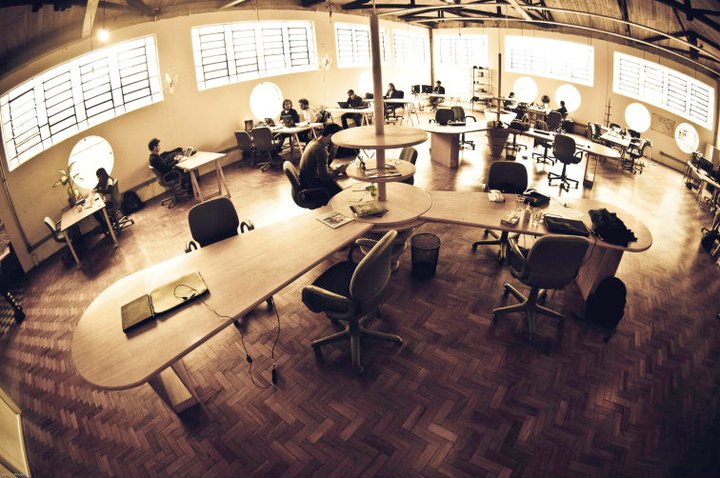 Let`s suppose you are reading this post, dear reader, at a quick interval you have given to yourself during your daily working journey. So: Are you sitting at your desk at an office? Or a sitting at your favorite chair at your home office, since you work remotely? What if neither of the questions are the right one? Maybe you do work remotely, but that doesn`t mean home is the best place for you to focus and produce.
Let`s suppose you are reading this post, dear reader, at a quick interval you have given to yourself during your daily working journey. So: Are you sitting at your desk at an office? Or a sitting at your favorite chair at your home office, since you work remotely? What if neither of the questions are the right one? Maybe you do work remotely, but that doesn`t mean home is the best place for you to focus and produce.
Research done by the ZZA for the British company Regus - Work Your Way – which calls itself "the world`s largest provider of flexible workspaces" – shows in numbers what many of us already knew by personal experience or from stories told by friends. Many times, working from home simply "doesn't work" – and it is better to find a more conducive place to settle down and do whatever is necessary for the boss.
ZZA talked to executives from 17.000 firms from around the world, and concluded that 52% of the professionals who work remotely from a "third place" use business centers full time or part time. Of that group, 72% spend at least three days or more of their productive week in their favorite business center or "third place" – in this last category, the research company includes business centers, clubs, libraries, cafes, or fast-food restaurants.
But concentrating while someone is taking a sip on a milkshake or talking about anybody else's life (and problems) might be too much distraction. As a result, 70% of the users of commercial centers consider this environment more productive.
According to specialists from Regus, working from such places brings a series of benefits to the worker, such as a balance between professional and personal life, less daily stress, and more productivity. And for the employers, less costs with maintenance of the workplace. "Commercially, we are talking about a tendency that makes work more productive and stimulating,” says Mark Dixon, CEO of Regus.
 "Most of the enquired professionals do not want to work at home. They prefer to develop their activities among other professionals, motivated by common purposes, without distractions and with access to technology and resources that are not easily available at home, and that allow more concentration on their daily tasks,” the report says.
"Most of the enquired professionals do not want to work at home. They prefer to develop their activities among other professionals, motivated by common purposes, without distractions and with access to technology and resources that are not easily available at home, and that allow more concentration on their daily tasks,” the report says.
Here in São Paulo, an idea imported from London and New York has established itself as a good alternative to work in a nice place without the burden of being "locked" inside an old traditional office. Paying a certain fee to "The Hub,” you can work as much as you want whenever you please and be surrounded by the coolest people in the region, as well as with access to phone landlines, high-speed wi-fi, faxes (who still uses them?), meeting and conference rooms, and kitchens where you can prepare a good (Brazilian) coffee. And just a few steps away is Exquisito!, one of the nicest bars in the region and the right place to hang out with your new colleagues after "work is over."
 But what if work is never over? That is a symptom felt more and more in many different countries worldwide and it is no different for Brazilians. On December 15, when almost everyone was basically either worried about the turkey for the Christmas feast (here we eat turkeys for Christmas, since we do not celebrate Thanksgiving) or thinking about a location close to the sea to celebrate the New Year (a local tradition, worth a different post just to explain it), the law that determines the general legal working conditions in the country was altered to include "teletrabalho" – or "virtual work" – in the same category as any other regular work task.
But what if work is never over? That is a symptom felt more and more in many different countries worldwide and it is no different for Brazilians. On December 15, when almost everyone was basically either worried about the turkey for the Christmas feast (here we eat turkeys for Christmas, since we do not celebrate Thanksgiving) or thinking about a location close to the sea to celebrate the New Year (a local tradition, worth a different post just to explain it), the law that determines the general legal working conditions in the country was altered to include "teletrabalho" – or "virtual work" – in the same category as any other regular work task.
So, if you (or your employee) read an e-mail written from a colleague at 11 pm before going to bed and answer it, both of you are considered "in work activity,” and therefore need to be paid for that work. The idea is applicable to any other electronic device that might be used in a similar way.
 The topic, of course, has brought up a lot of discussion among people who are used to these after-hours practices and are not remunerated in a way they think is fair. Many are enthusiastic about how much that would mean in their pockets. At the same time, it is probably frightening many employers, who might soon collect the BlackBerries they have given their executives and staff members. Even though it sounds like good news to most people, no one around here is sure yet of how that overtime will be checked officially or upon what basis judicial decisions will be made in such cases. Well, in the meantime, we`d better get back to work!
The topic, of course, has brought up a lot of discussion among people who are used to these after-hours practices and are not remunerated in a way they think is fair. Many are enthusiastic about how much that would mean in their pockets. At the same time, it is probably frightening many employers, who might soon collect the BlackBerries they have given their executives and staff members. Even though it sounds like good news to most people, no one around here is sure yet of how that overtime will be checked officially or upon what basis judicial decisions will be made in such cases. Well, in the meantime, we`d better get back to work!
























